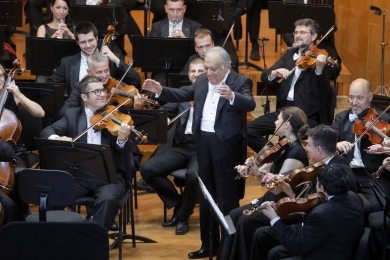Belgrade Philharmonic Orchestra
Marking its centennial in 2023, the Belgrade Philharmonic Orchestra is nowadays the leading orchestra in the region and a gust of fresh air on the international concert scene. According to the international media, the Belgrade Philharmonic is Serbia’s cult orchestra (The Financial Times), one of the leading European orchestras (The Independent), an orchestra for which there’s no looking back (The Washington Post), and an ensemble which shows grand dose of heritage and pride (The New York Times). The orchestra’s distinctive image, as well as its creative and often provocative marketing, have influenced the recognition of the orchestra as an exponent of social changes. Thus, the BPO quickly attracted many classical music authorities, who supported its further development. Most notably, it has fostered a long-lasting friendship with Zubin Mehta, who first encountered with Belgrade Philharmonic through a concert held in 1958. Following the political changes in October 2000, Mehta became a regular guest and a great friend and supporter of Belgrade Philharmonic, helping the institution to raise awareness about the necessity of making better working conditions for the best ensemble in the region (i.e., acquiring new instruments, and building the long-awaited new hall of the orchestra). He has held gala concerts more than ten times in the past decade, for the benefit of the Belgrade Philharmonic Foundation for which he holds an honorary presidency. The Belgrade Philharmonic Orchestra initiates, realizes and supports actions contributing to social progress, promotion of tolerance, regional and international cooperation. The original and unique concept of the New Year’s concert series, promoting ethnic and religious diversity through music, has raised significant attention of the domestic and international public, and it was also acknowledged and supported by the European Union. Lead by Zubin Mehta, the orchestra has held its first concert performance in Croatia (Dubrovnik), after the Yugoslav wars. Also, the Belgrade Philharmonic Orchestra initiated and realized a regional cooperation of the three national philharmonic orchestras from Serbia, Croatia and Slovenia, in recent history, under the Pika-točka-tačka (Dot-Dot-Dot) project. This project was supported by The State Department. One of the most important projects in the recent past was the Beethoven Marathon, organized through the coproduction between Belgrade and Dortmund philharmonics. In June 2022, in Dortmund and then in Novi Sad, European Capital of Culture 2022, two orchestras took turns in performing all symphonies by the composer. All concerts were conducted by Gabriel Feltz, Chief Conductor of both orchestras. In the past decade, the orchestra has had successful international tours and guest performances in Italy, Germany, Austria, Switzerland, Sweden, France, Slovenia, Bosnia and Herzegovina, Croatia, Hungary, Russia, Oman, etc. The most significant international engagement in the orchestra’s recent history was the first ever U.S. tour, which included concerts in the main halls of Chicago, Cleveland, Washington D.C., and New York, in October 2014. One of the recent achievements of the Belgrade Philharmonic Orchestra is also the greatest ever open-air classical music concert in the Balkans, held in June 2017 in Belgrade, which was attended by more than 30,000 people. The concert was led by Chief Conductor Gabriel Feltz, while Zubin Mehta featured as the special guest. In the following year, the Belgrade Philharmonic has surpassed this success by gathering more than 40,000 people at one concert. The most important goals of the orchestra within its five-year planning of activity and development are positioning on the international music scene, promotion on other continents, and building the new concert hall in Belgrade – one of the most significant investments in cultural projects in Serbia. During concert season 2023-24, the Belgrade Philharmonic is celebrating its centenary with several large-scale projects, making its way to a new chapter in its history.


